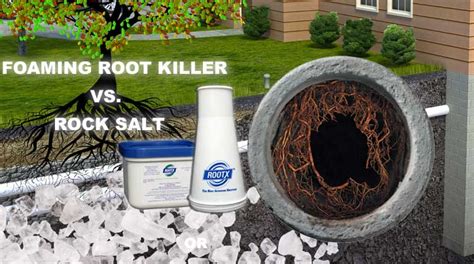Rock Salt for Roots in Pipes: Myth or Magic?
Roots in pipes are a homeowner's nightmare. Those tenacious tendrils can wreak havoc on plumbing systems, causing blockages, leaks, and costly repairs. One purported solution that circulates through online forums and anecdotal advice is using rock salt to eliminate these troublesome intruders. But does this age-old remedy hold any water (pun intended)? Let's delve into the facts and separate myth from magic.
Does Rock Salt Kill Roots in Pipes?
The short answer is: partially, but not reliably. Rock salt, or halite (sodium chloride), is a desiccant, meaning it draws moisture away from its surroundings. This can, in theory, dehydrate the roots that penetrate your pipes, eventually killing them. However, several factors significantly limit its effectiveness:
- Accessibility: Rock salt needs direct contact with the roots to be effective. If the roots are deeply embedded in the pipe or surrounded by soil, the salt may not reach them.
- Concentration: A sufficient concentration of salt is crucial for dehydration. Simply adding a small amount won't yield significant results. Excessive amounts, however, can damage your pipes over time.
- Pipe Material: The type of pipe material also plays a role. Rock salt's corrosive properties can exacerbate damage to certain pipe materials, particularly older metal pipes.
- Root Type and Size: Larger, established root systems are less likely to be affected by rock salt than smaller, newly developing roots.
How Does Rock Salt Work (Theoretically)?
The mechanism behind the supposed root-killing action of rock salt involves osmosis. Rock salt dissolves in water, creating a hypertonic solution – a solution with a higher concentration of solutes (salt) than the root cells. This causes water to move out of the root cells and into the higher concentration salt solution, leading to dehydration and ultimately, root death.
What are the Alternatives to Rock Salt?
While rock salt might offer a slight chance of success in some limited situations, it's not a reliable or recommended method for root removal. More effective and safer alternatives include:
- Professional Hydro-Jetting: This involves using high-pressure water jets to blast away roots and other debris from pipes. It’s the most thorough method.
- Root-Killing Chemicals: These chemicals are specifically designed to dissolve roots and are applied by professionals. They are effective but require careful handling due to their potentially harmful nature.
- Pipe Replacement: In severe cases, the only solution might be replacing the affected sections of pipe. This is a more costly option, but it ensures a long-term solution.
Is Rock Salt Harmful to Pipes?
While the primary concern is its effectiveness against roots, rock salt can harm your pipes, especially older metal pipes. The salt's corrosive properties can accelerate the deterioration of metal pipes, leading to leaks and further complications. Therefore, it's crucial to weigh the potential risks against the limited benefits.
Can Rock Salt Damage the Environment?
The impact of rock salt on the environment is another concern. Excessive salt can contaminate soil and groundwater, affecting local ecosystems. Therefore, using alternative root removal methods that are environmentally friendly is always preferable.
How to Prevent Roots from Entering Pipes?
Preventing root intrusion in the first place is always the best approach. This involves:
- Regular maintenance: Inspecting your pipes regularly for any signs of root intrusion.
- Proper tree planting: Planting trees a sufficient distance away from your sewer lines.
- Regular cleaning: Ensuring proper drainage to prevent waterlogging that could attract roots.
Conclusion: Rock Salt for Roots – A Risky Gamble
In conclusion, using rock salt to remove roots from pipes is more of a myth than magic. While it might offer limited success in very specific cases, the risks outweigh the potential benefits. More effective, reliable, and environmentally responsible methods exist for dealing with roots in pipes. Always consult with a plumbing professional for the best course of action. Prevention is key, and regular maintenance is essential for a healthy and functioning plumbing system.

